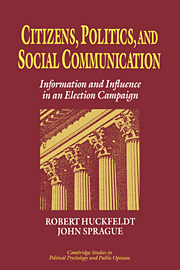Book contents
- Frontmatter
- Contents
- Acknowledgments
- I Democratic politics and social communication
- II Electoral dynamics and social communication
- III Networks, political discussants, and social communication
- 6 Political discussion in an election campaign
- 7 Networks in context: The social flow of political information
- 8 Choice, social structure, and the informational coercion of minorities
- 9 Discussant effects on vote choice: Intimacy, structure, and interdependence
- 10 Gender effects on political discussion: The political networks of men and women
- IV The organizational locus of social communication
- Bibliography
- Index
9 - Discussant effects on vote choice: Intimacy, structure, and interdependence
Published online by Cambridge University Press: 22 March 2010
- Frontmatter
- Contents
- Acknowledgments
- I Democratic politics and social communication
- II Electoral dynamics and social communication
- III Networks, political discussants, and social communication
- 6 Political discussion in an election campaign
- 7 Networks in context: The social flow of political information
- 8 Choice, social structure, and the informational coercion of minorities
- 9 Discussant effects on vote choice: Intimacy, structure, and interdependence
- 10 Gender effects on political discussion: The political networks of men and women
- IV The organizational locus of social communication
- Bibliography
- Index
Summary
Political discussion during an election campaign is an important vehicle of social influence – a means whereby the preferences of individuals are brought into correspondence with political surroundings. Correspondingly, the study of discussion effects is not simply an examination of dyadic information flows. Rather, it is one part of a more thorough explication of the political linkages that lie between individuals and groups within the society, and of the manner in which individual politics is imbedded within the larger community. This chapter addresses a series of questions related to the influence of political discussion. To what extent are political preferences affected by discussion? What types of discussant relationships are most likely to foster political influence? What types of discussants are most influential?
One important arena of social influence in an election campaign is the person-to-person transmission of political opinion and preference that occurs during political discussion. When one citizen discusses politics with another citizen, the stage is set for the politics of one or both discussion partners to be affected. Indeed, these dyadic encounters provide the most common characterization of social influence – the model of two citizens engaged in earnest political discourse. The characterization is, of course, often divorced from reality. Political discussion is typically unstructured, episodic, and frequently unsustained. More important, political discussion is not the only or even the most important form of social influence (Eulau 1986; Przeworski 1974).
- Type
- Chapter
- Information
- Citizens, Politics and Social CommunicationInformation and Influence in an Election Campaign, pp. 159 - 190Publisher: Cambridge University PressPrint publication year: 1995

